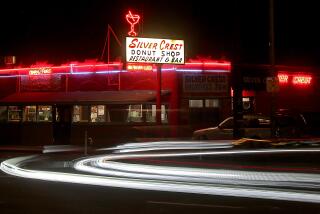Franchising moves ahead after slump during recession
Lodging, healthcare and casual dining are leading in the recovery. Military veterans offer a rich resource of franchisees because of their strong worth ethic, business owners say.
FORT WORTH, Texas — Heidi McGregor sells medical equipment, and her husband, Jim, owns an ambulance dealership in Fort Worth. On the road extensively, they were looking for another business to develop.
They settled on a pizza franchise, buying the rights to the first two Toppers Pizza franchise restaurants in Texas.
This summer, the McGregors, who live near Texas Christian University, plan to open their first restaurant nearby just in time for the return of students. And they are scouting another burgeoning area for the second.
“Both of our businesses have us traveling all over the place,” said Heidi McGregor, 33, who has two school-age children. “Sometime in the future,” the restaurants might offer a full-time living and opportunity to stay home, she said.
The McGregors aren’t alone.
Franchising, which has hurt by crimped consumer spending and the tight lending climate during the downturn, is making a comeback. U.S. franchise establishments are expected to climb 1.7% this year to 748,680, their first increase since 2008, according to the International Franchise Assn. That’s down from 774,016 in 2008.
Some of the segments leading the way are lodging, healthcare and casual dining.
“We were growing at a pretty nice clip prior to the recession,” said Matt Haller, vice president for the franchise association in Washington. “We’re only starting to see lending loosen a little bit as we move through the year.”
Lodging franchising, which had a “large drop-off” during the downturn, has picked up with easier credit and more business travel, Haller said. Healthcare franchising, part of the industry’s personal services segment, is expanding with the aging population. And quick-service dining is growing, he said.
The university area already has several pizza restaurants, including national chains. But the McGregors, who used to own a Comet Cleaners franchise but have never been in the food business, zeroed in on Toppers for its niche: late-night delivery and products topped with Wisconsin cheese, such as Topperstix breadsticks with pizza on top.
The startup cost is about $450,000 per store, which the couple are financing in part with a Small Business Administration loan. Royalties to Toppers are 5.5% of sales. The McGregors also recruited a general manager to run the restaurants.
“It was a little tough” finding financing, Heidi McGregor said. “A lot of the local banks had a hard time wanting to loan money for something they weren’t familiar with.”
After they floated an online inquiry, a Frisco, Texas, bank popped up. The couple’s long-term goal: four to five restaurants around Fort Worth.
Scott Gittrich, CEO of the 21-year-old Wisconsin chain, which has 41 restaurants, 31 of them franchised, said it had “picked up pretty good speed” leading up to 2008, but growth slowed when some prospective franchisees couldn’t get loans.
“We changed who we were talking to,” Gittrich said. “We started looking at candidates who had higher net worth, more liquidity. We had fewer qualified prospects, but in retrospect, we feel stronger for it.”
Franchising also became a potential outlet for people who lost jobs during the downturn.
Ian Stover, 35, of Frisco, Texas, was laid off from a construction job and intended to go into teaching.
“I was sitting in class, in a boring lecture, going through my BlackBerry,” he said, when he spotted a post about a Soccer Shots franchise on a soccer coaching site.
Soccer Shots franchisees partner with local schools, youth organizations and parks to conduct clinics. They have low overhead, typically with no brick-and-mortar costs.
Stover, who was already a volunteer soccer coach, was interested and ultimately bought rights to the Denton and Collin County territories. He borrowed $8,500 on a zero-interest credit card to foot the low startup costs in August 2008. (Today, the franchisee fee is $12,500, total startup costs are as high as $16,000, and the royalty rate is 7% of sales, the company says.)
Stover’s wife, Caresa, continued her job at a bank until joining the soccer company full time in July 2009. Stover says he expects the company to surpass $200,000 in revenue this year.
Military veterans have become a rich pool of prospective franchisees, as the Iraq and Afghanistan drawdowns accelerated and more former service members look for private-sector opportunities.
Former Marines Rebecca and Michael McMahon of Flower Mound are launching a franchise of the Grounds Guys landscaping company in Southlake this summer.
The McMahons both served in Iraq and were discharged in 2004. Afterward, she worked as a federal employee and he was a diesel mechanic. Still, they were looking for something outdoors-focused. And they were both interested in landscaping, Rebecca McMahon said.
Total startup costs are as high as $130,000, with a 7% royalty and 2% advertising fee, and the Grounds Guys offers discounts on the franchise fee to veterans. Eighteen of its 70 franchisees are veterans, the company said.
“These folks know how to work hard, they know how to show up on time,” said Ron Madera, president of the Grounds Guys. “That’s a value that’s not easy to find in America today.”
Nishimura writes for the Fort Worth Star-Telegram/McClatchy.






